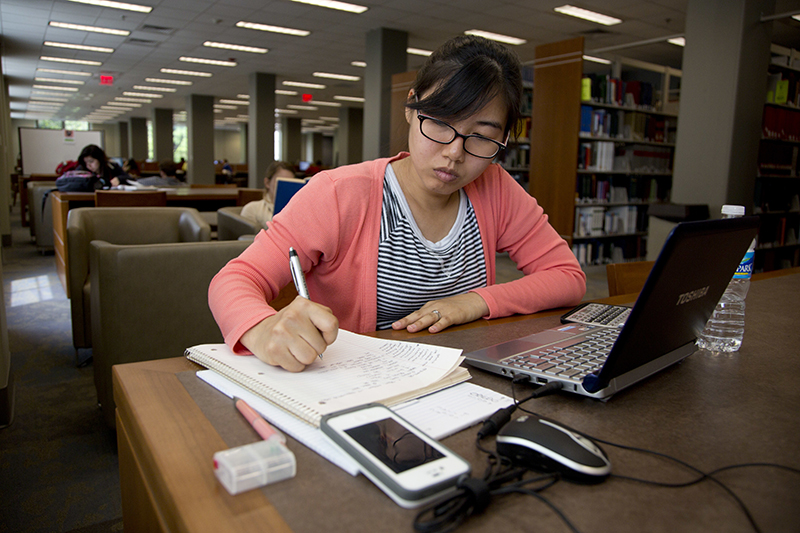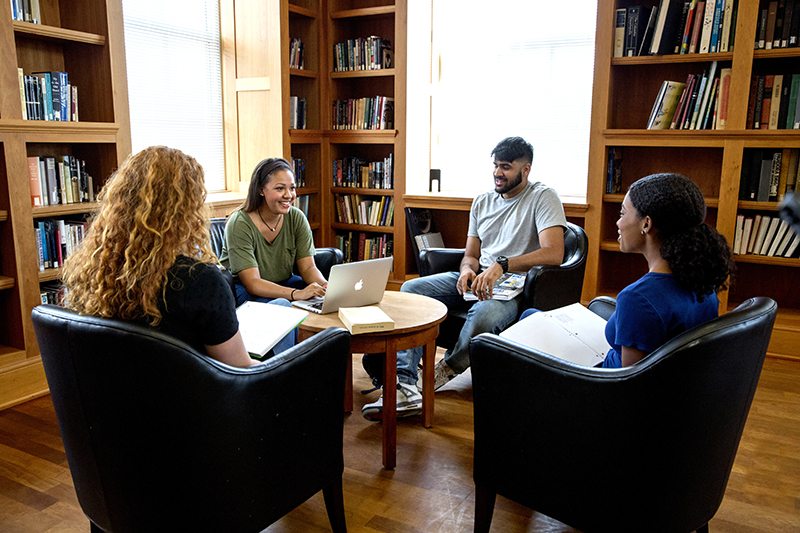FACTS. Resources and Services for Students at UGA Libraries
At the UGA Libraries, we've got FACTS:
- Friendly, resourceful librarians and staff, ready to help
- Access to knowledge, online, on our shelves, and in our vaults
- Convenient study spots, ideal for concentrating or collaborating
- Tech and labs to take your projects to the next level
- Savings to students by making learning more affordable
Your UGA ID is your library card, and that opens your gateway to knowledge at the UGA Libraries. Find out more below and be sure to follow us on Instagram at @ugalibs and other social media to learn about workshops, events, resources, and more.
F — Friendly, resourceful librarians and staff, ready to help
 Learning to write college essays can be tricky, but librarians are here to help. They can help you find the best, most credible resources, hook you up with software that makes citations easier, and suggest new approaches to research.
Learning to write college essays can be tricky, but librarians are here to help. They can help you find the best, most credible resources, hook you up with software that makes citations easier, and suggest new approaches to research.
Students have many options when it comes to getting help. They can ask a librarian at the reference desk at any of our locations, or they can chat virtually through our website. For more in-depth questions, it might be a good idea to make an appointment for a virtual consultation with your subject area specialist. UGA librarians are ready to help guide students on their academic journey.
A — Access to knowledge, online, on our shelves, and in our vaults
When you visit UGA’s libraries, you will find more than 4.6 million books that span academic subject areas and genres, from poetry and fiction books to musical scores and even the latest movies and television shows on DVD. But your UGA card provides access to even more. Students can also comb through digital resources for the latest electronic journals, wide-ranging databases, and more. If a student needs something that isn’t available in our collections, our librarians can get access through Interlibrary Loan and other services.
Our Map and Government Information Library in the sub-basement of the Main Library contains one of the largest map collections in the Southeast, and between their documents, our microfilm collection and the Georgia Newspaper Project from our partners at the Digital Library of Georgia, researchers can find tons of information from historical records.
In the vault of our Special Collections Building, students and researchers can find historic treasures that document everything from 600-year-old medieval manuscripts to marketing files from the heyday of hip hop music, and from UGA’s founding documents to its football legacy, as well as other topics such as politics, fashion, the arts and sciences, and more. Our archives are filled with documents, diaries, rare books, and memorabilia, as well as oral histories, historic newsfilm, home movies, and other electronic media.
Students and researchers can start their explorations in person or at libs.uga.edu.

C — Convenient study spots, ideal for concentrating or collaborating
No matter your study style, UGA Libraries has options for students to get ready for their tests and projects. Our locations span campus, from the seven-story Main Library on North Campus, to the busiest academic building on campus, the Miller Learning Center, and our vibrant McBay Science Library on South Campus. In all three buildings, each floor has unique features for studying, whether you need a quiet spot with no distractions, a room with a view, somewhere to get a group together to figure out a project, or some tech to get things rolling. Students can get some sustenance and caffeine in those locations too. These spaces are open late for members of the UGA community, but students should bring their college ID to study at Main and McBay after 6pm, and the MLC after 9 p.m.
In addition to the Carnegie Library on the Health Sciences campus, we also operate three smaller East Campus locations. They are dedicated to art, music, and curriculum materials (College of Education). We also partner with the College of Environment and Design and School of Veterinary Medicine for reading rooms that might be great spots to hit the books. The Libraries’ website contains more information about study spaces at its facilities, and students can check out this mapping tool to find study locations on campus.
T — Tech and labs to take your projects to the next level
While many students arrive on campus with a device to help with their studies, they can find just about all of the technology that they might need at UGA Libraries. In addition to computer stations throughout our largest locations at Main, Science, and the MLC, specialized stations include high-powered machines equipped with software that can fuel any creative project, and laptops can be checked out at all three spots. Printer kiosks, scanners, and charging locations can be found throughout our facilities.
With specialized labs, students can take their creativity to the next level. At the Science Library, students can put their research into action in the Makerspace, making use of 3D printers, laser engravers, VR equipment, and more. In the Willson Center’s Digital Humanities Lab at the Main Library, students can learn about data visualization and the software that can make it happen, and they can gain map-making skills in the GIS Lab at MAGIL. At the MLC, students can check out cameras and other equipment, or book some time in the recording studio.
S — Savings to students by making learning more affordable
The UGA Libraries are committed to affordable learning. We partner with faculty members to provide open source and supplemental course materials when they are available, and checking out books and technology can help to provide savings to students.
In addition, the Libraries provide opportunities for students to earn money too. Our student employment opportunities include providing security to keep our buildings safe and open for late-night study sessions, working at our service desks, preparing our special collections exhibits and tours, getting involved in publishing with the UGA Press or Georgia Review, and more. Some internships check off your experiential learning credit, and many are open to those who qualify for federal work study. Check out UGA’s Handshake portal to browse current job openings, and find out more by asking at your favorite location.
In addition, watch out for our annual student contests, which feature cash prizes for the winners. In the fall, students can get creative to explain a research topic with our Capturing Science Contest. And in the spring, students can win a prize and get a better grade on a paper by consulting with a librarian and entering the Libraries Undergraduate Research Awards contest.
Be sure to follow us on Instagram at @ugalibs and other social media to find out about workshops, events, resources, and more.
